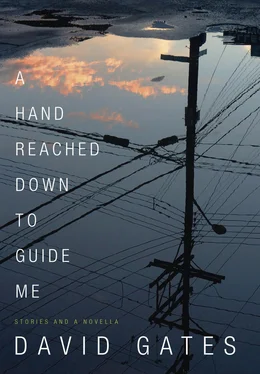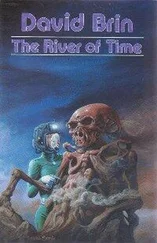“Right,” I said, “you’re the first person who ever got drunk and wet the bed. You should donate your body to medical science.”
“Better,” he said. “Now that’s you. Ah—here they are. I did have a lot to drink, didn’t I? Maybe we should try to forget this gruesome episode? Assuming I don’t put on a repeat performance?”
“You’ll be telling this on yourself when you’re ninety,” I said. “Adventures of your misspent youth.”
“Don’t jolly me along too much.” He opened the bathroom door. “But I do appreciate your making the effort.”
—
His daughter was going to put us up at her house, but after what happened in Montana, he called her to say we’d decided to stay at a hotel: I was used to his snoring, he said, but lately it had gotten so bad that he was afraid of keeping them awake. She must have thought I was being a princess about their foldout, or just being weird.
Madeleine turned out to be a short redhead about my age, with milky skin like the daughter’s, smiley crow’s-feet like mine (though mine weren’t smiley) and breasts that swung free under a man’s plaid flannel shirt; you could see why an old man might be hot for her. Why a young woman might too. At the door, she went up on her toes to kiss his cheek. “I love the beard,” she said. “Very manlike.” She gave me her hand.
“So where’s your friend?” he said.
“Getting stuff for dinner. I expected her back by now.”
“We were going to take you out.”
“I’ll let you guys argue about that,” she said. “I think she’s got something special up her sleeve.”
“As do you,” he said. “God, it’s good to see you.”
She threw up her little hands. “Why, Hopsie, you ought to be kept in a cage.” The two of them seemed to be amused by this. “Let’s go sit. Can I get you some tea or something? Now you ,” she said to my husband, “you probably want the something.”
“I think tea, actually. It’s a bit early.”
She looked at me. “What have you done to this man?”
“We’re still on East Coast time,” I said.
“I thought that was three hours later ,” she said. “Sorry, I shouldn’t be pushing drinks.”
She was putting the tea ball into a round blue-and-gold teapot that must have been a Hall—my mother had collected them—when I heard the kitchen door open, a voice I knew calling “A little help ?” and I found myself on my feet and through the archway, with Madeleine behind me.
“Let me,” I said, and picked up a bright yellow canvas bag with “Nature’s Way” printed in red; she had two more bags on the doorstep, all bulging, one with stalks of celery sticking out.
“Oh my,” Madeleine said. “Did we overdo?”
“Did we ? No, we are blameless. As always.” She kicked the door shut with the sole of her boot, put down a bag and saw me. “You got here,” she said. “Big change of plans—I’m going to make Flemish soup with winter vegetables. I read about it in the store. I think I wrote it down.” She unwrapped her scarf and I could see her cheeks were red.
“You must be freezing,” Madeleine said. “I just made some tea.”
“Yeah, I don’t drink that shit.”
“Since when?”
Her father had appeared in the archway. “Hey,” she said. She reached into one of the bags and held up a bottle of Rémy by the neck. “See? I made a stop just for you guys.”
“Well,” he said. “Since you went to the trouble.”
“And?” she said to me. “Do you care about my trouble?”
“You didn’t make a stop in addition to your stop, did you?” Madeleine said.
“Why?” she said. “Do I seem cerebral? No, what am I trying to say? Cel-e-bra-tory. That’s a hard word.”
“Oh, honey,” Madeleine said. “Why don’t you let me put stuff away and you can go sit with your father.”
“I think I need to get to the bathroom.” She headed down the hall, meandering rubber-legged to one side, her shoulder displacing a poster of Patti Smith.
“What’s all this ?” her father said.
“I’m not sure,” Madeleine said. “This isn’t her usual.”
“Is she just drunk?” I said.
“Well,” Madeleine said. “This is Portland. I better go in and see about her.”
The house was small enough so we could hear vomiting. My husband got up and went to the kitchen; he came out with a glass of Rémy for each of us. “Cheers,” he said. “She does have a flair for the dramatic. Poor Madeleine.”
“What about her ?”
“I imagine she’ll pay for it tomorrow.”
I heard more vomiting, then water running. “Should I go in?” I said.
“They’d probably rather you didn’t. This isn’t quite the jolly visit you had in mind.”
“Probably not what she had in mind, either.”
“That would be the charitable view,” he said.
I heard the bathroom door open, then the two of them moving toward their bedroom. We finished our glasses, and he got up and poured us more. “May we always have the wind at our back,” he said. “To get us the hell out of here.”
Madeleine came in and sat on the sofa. “God, I am so sorry about this. I don’t even know what to say to you. She has some friends I wish she didn’t see.”
“So is this a regular occurrence?” he said.
“ No . That’s the thing. I don’t know, maybe it was you coming here—I mean, please don’t think I’m blaming you . You know she loves you. It’s just so out of character.”
“How is she?” I said.
“I think she might sleep. She feels terrible about this. As far as I can tell. When do you have to leave?”
“Early,” he said. “Unfortunately.” Our plane didn’t leave till two.
“Crap,” she said. “Well, whatever.”
“I’m just sorry you have to deal with this,” he said.
“Should we go in and say goodbye?” I said.
“I think maybe not?” she said. “We’ll all be in touch.”
—
When we got home and I went through the mail, I found a birth announcement from my brother and his wife—what was this, number three?—and an invitation to Andrea’s wedding, forwarded from the old address in Rhinebeck. To a Thomas Somebody, at St. Somebody’s Church in Belmont, Massachusetts, June something. Below the engraving, in her handwriting: Please please please come. Miss you. Much loves, Andy. P.S. bring the huz!
Of course I’d neglected her, along with my other friends—that’s what the “Miss you” was about. She’d stopped offering me pieces when Mirabella went under and she’d gone on to Marie Claire , and then I think to Vogue , and now she was someplace else. She’d come up to Rhinebeck for a weekend, back during the living-in-sin era; then the three of us had dinner in the city, and after that I’d taken the train down to meet her for lunch a couple of times. The huz had said she depressed him.
“Why, because she’s not pretty?” I’d said.
“I wouldn’t mind that so much. You bring enough pretty for two. It’s more, what would you call it, the non-pretty syndrome .”
“You mean she tries too hard.”
“Ah,” he said, and kissed his fingertips at me. Back then it still made me wonder—these little things that seemed faggy. I imagine you’ve wondered too, but it was just him.
True, when Andrea was around men the voice went up, the hands were always going, fluttering, playing with her hair or—the worst—tugging her blouse down, since she was a little overweight, and she would make her eyes go wide and ask them questions and then say “ Real ly?” But when you were one-on-one, she sat still and you could talk. Okay, I can’t defend “Much loves,” and certainly not from a grown woman, I don’t care how long she’d been working at those magazines. At Yale she’d done a paper taking down Lionel Trilling’s takedown of Ethan Frome , on which her professor—not Harold Bloom, but not nobody—had written: Against my better judgment, you have persuaded me about this lady . So what sort of creature must Thomas be? Either he was someone who had come to see her—knowing men, I wasn’t hopeful—or he was as graceless and overweight and desperate as she was, which you’d suspect from a back-to-the-hometown church wedding in June.
Читать дальше











